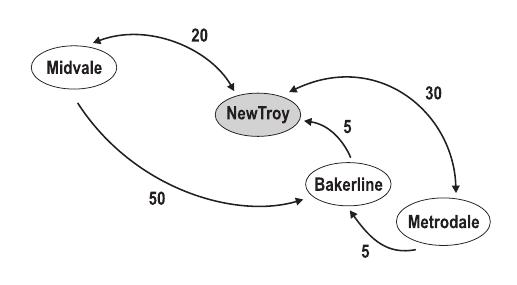标签:最短路
 e
(German for a one-way street) is a street on which vehicles should only move in one direction. One reason for having one-way streets is to facilitate a smoother flow of traffic through crowded areas. This is useful in city centers, especially old cities like
Cairo and Damascus. Careful planning guarantees that you can get to any location starting from any point. Nevertheless, drivers must carefully plan their route in order to avoid prolonging their trip due to one-way streets. Experienced drivers know that there
are multiple paths to travel between any two locations. Not only that, there might be multiple roads between the same two locations. Knowing the shortest way between any two locations is a must! This is even more important when driving vehicles that are hard
to maneuver (garbage trucks, towing trucks, etc.)
e
(German for a one-way street) is a street on which vehicles should only move in one direction. One reason for having one-way streets is to facilitate a smoother flow of traffic through crowded areas. This is useful in city centers, especially old cities like
Cairo and Damascus. Careful planning guarantees that you can get to any location starting from any point. Nevertheless, drivers must carefully plan their route in order to avoid prolonging their trip due to one-way streets. Experienced drivers know that there
are multiple paths to travel between any two locations. Not only that, there might be multiple roads between the same two locations. Knowing the shortest way between any two locations is a must! This is even more important when driving vehicles that are hard
to maneuver (garbage trucks, towing trucks, etc.)
4 2 5 NewTroy Midvale Metrodale NewTroy <-20-> Midvale Midvale --50-> Bakerline NewTroy <-5-- Bakerline Metrodale <-30-> NewTroy Metrodale --5-> Bakerline 0 0 0
1. 80
题意:给出三个数 n, c, r
n 个地点(包括公司的车库),c 表示c辆车抛锚的地点, r 条道路
第二行给出 c+1 个地点,第一个为车库地点, 其余的 c 个为车的地点。
接下来的 r 行表示 r 条有向的道路,
s1 -- d -> s2 表示 s1到s2 的长度为 d
s1 <- d -- s2 表示
s2到s1 的长度为 d
s1 <- d -> s2 表示 s1到s2为双向边, 且长度为 d
拖车从车库出发到每个地点,在该地点拖回抛锚的车子。
一辆拖车一次只能拖回一辆车子。
注意:同一个地点可能有多辆抛锚的车子
求总的路径长度。
还要输出 case number
<span style="font-size:18px;">#include <cstdio>
#include <iostream>
#include <cstring>
#include <cmath>
#include <string>
#include <algorithm>
#include <queue>
#include <stack>
#include <map>
using namespace std;
const double PI = acos(-1.0);
const double e = 2.718281828459;
const double eps = 1e-8;
const int MAXN = 1010;
const int INF = 1<<29;
char str[1010][1100];
int dist[110][1100];
char s1[110];
char s2[110];
map<string, int>m;
int n;
void Floyd()
{
for(int k = 1; k <= n; k++)
{
for(int i = 1; i <= n; i++)
{
for(int j = 1; j <= n; j++)
if(dist[i][j]>dist[i][k]+dist[k][j])
dist[i][j] = dist[i][k]+dist[k][j];
}
}
}
int main()
{
//freopen("in.txt", "r", stdin);
//freopen("out.txt", "w", stdout);
int c, r;
int num = 1;
while(cin>>n>>c>>r)
{
if(!n && !c && !r)
break;
for(int i = 0; i <= n; i++)
{
for(int j = 0; j <= n; j++)
dist[i][j] = (i==j?0:INF);
}
for(int i = 0; i <= c; i++)
{
cin>>str[i];
}
int d, x, y;
char from, to;
int cnt = 1;
m.clear(); // 注意清空,wa 了很多次
for(int i = 0; i < r; i++)
{
scanf("%s %c-%d-%c %s", s1, &from, &d, &to, s2);
if(!m[s1])
m[s1] = cnt++;
if(!m[s2])
m[s2] = cnt++;
x = m[s1];
y = m[s2];
if(from=='<' && d<dist[y][x])
dist[y][x] = d;
if(to=='>' && d<dist[x][y])
dist[x][y] = d;
}
Floyd();
int start = m[str[0]];
int sum = 0;
for(int i = 1; i <= c; i++)
sum += dist[start][m[str[i]]]+dist[m[str[i]]][start];
printf("%d. %d\n", num++, sum);
}
return 0;
}
</span>HDU 2923 Einbahnstrasse(最短路 Floyd)
标签:最短路
原文地址:http://blog.csdn.net/u014028317/article/details/46496795